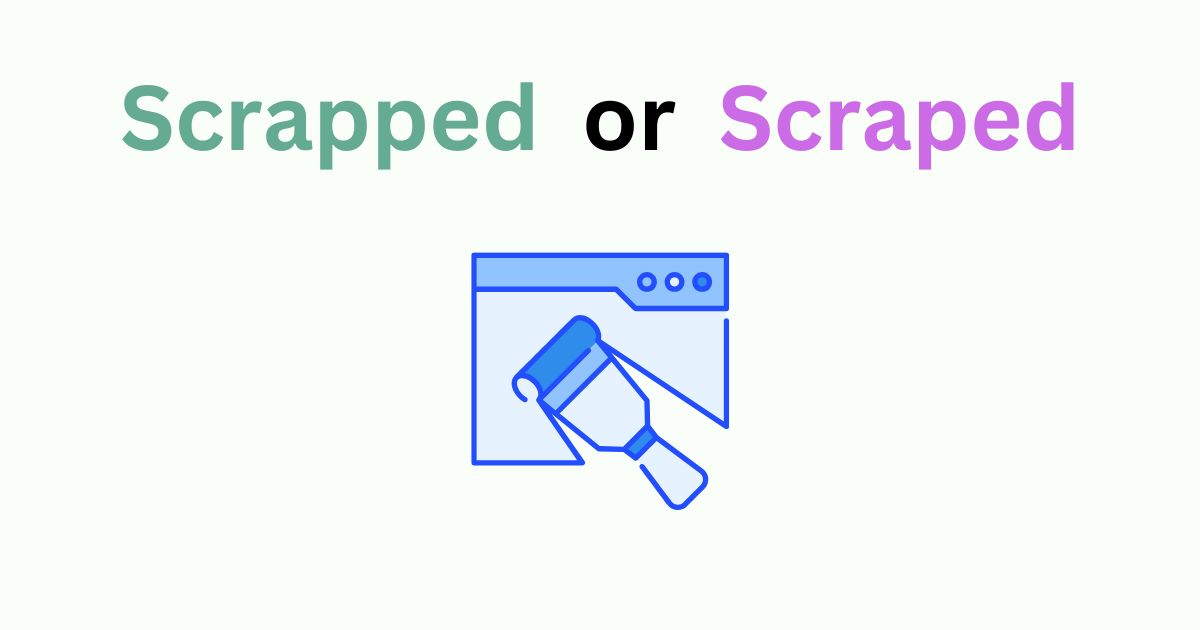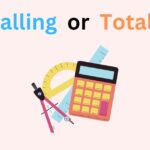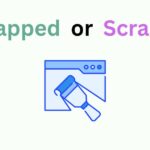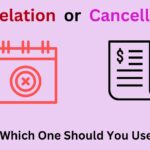Ever get stuck choosing between “scrapped” or “scraped” when writing? These lookalike words mean totally different things! “Scrapped” means something was thrown away or canceled completely. Think of a project that got abandoned. “Scraped” means something rubbed against a surface, like scraping your knee or scraping frost off a window. Mix them up, and your meaning changes entirely! This guide will help you use each word correctly.
Why the Confusion Between “Scrapped” and “Scraped”?
These words cause confusion because they:
- Look nearly identical (just one letter different)
- Sound similar when spoken
- Both can function as past tense verbs
- Appear in somewhat similar contexts
Even native English speakers mix them up regularly. Let’s clear up this confusion once and for all.
Simple Answer
“Scrapped” and “scraped” have different meanings. “Scrapped” means to discard or abandon something, like a plan or project. “Scraped” refers to dragging something across a surface, often causing damage or collecting residue. For example, “The old car was scrapped” (discarded), while “She scraped her knee on the pavement” (got a minor injury).
The Meaning of “Scrapped”
Definition & Explanation
“Scrapped” means to discard, abandon, or throw something away completely. When you’ve scrapped something, you’ve gotten rid of it entirely. This usually happens when something is no longer useful or valuable.
Think of “scrapped” as connected to the noun “scrap,” which means leftover pieces or waste material. When cars go to a scrapyard, they’re finished – no longer useful as vehicles.
Common Uses of “Scrapped”
We typically use “scrapped” when discussing:
- Abandoned projects: “The company scrapped the app after finding too many bugs.”
- Canceled plans: “We scrapped our vacation plans because of the storm.”
- Discontinued products: “The manufacturer scrapped that model after poor sales.”
- Rejected ideas: “The team scrapped the original concept and started over.”
Synonyms for “Scrapped”
- Abandoned
- Discarded
- Canceled
- Thrown away
- Disposed of
- Rejected
- Junked
- Terminated
- Discontinued
The Meaning of “Scraped”
“Scraped” refers to the action of rubbing or dragging something across a surface. This often involves friction and might remove a thin layer from something. The important difference is that “scraping” doesn’t mean getting rid of the whole thing.
Common Uses of “Scraped”
We use “scraped” when talking about:
- Minor injuries: “She scraped her knee on the playground.”
- Cleaning actions: “He scraped the mud off his boots.”
- Food preparation: “I scraped the seeds out of the vanilla pod.”
- Removing frost: “I scraped ice off my windshield this morning.”
- Data collection: “The website scraped information from public profiles.”
Key Differences Between “Scrapped” and “Scraped”
Grammatical Differences
Both words function as past tense verbs, but they come from different base verbs:
- “Scrapped” comes from “to scrap” (meaning to discard)
- “Scraped” comes from “to scrape” (meaning to rub against a surface)
“Scrap” can also be a noun (leftover pieces), while “scrape” can be both a noun (the mark left by scraping) and a verb.
Meaning & Context Differences
The core difference lies in what happens to the object:
- When something is scrapped, it’s completely discarded or abandoned.
- When something is scraped, it remains mostly intact but its surface has been affected.
Scrapped implies a decision was made to get rid of something entirely, while scraped describes a physical action that affects only part of something.
Read Also: Pick Up or Pickup? Avoid This Common Mistake
Comparison Table: Scrapped vs Scraped
| Aspect | Scrapped | Scraped |
| Basic meaning | To discard or abandon | To rub against a surface |
| What happens | Complete removal | Surface contact or partial removal |
| Intentionality | Usually deliberate | Can be accidental or deliberate |
| Physical action | Not necessarily physical | Always involves physical contact |
| Result | The item is gone | The item remains (though affected) |
| Common contexts | Business, planning, manufacturing | Daily activities, cooking, injuries |
When Should You Use “Scrapped” or “Scraped”?
Ask yourself these questions to determine which word to use:
- Are you throwing something away completely? → Use “scrapped”
- Are you describing rubbing against a surface? → Use “scraped”
- Will the thing still exist afterward (even if damaged)? → Use “scraped”
- Are you canceling or abandoning something? → Use “scrapped”
Common Mistakes and How to Avoid Them
The most common mistake is simply mixing up these words without realizing their different meanings. For example:
- INCORRECT: “We scraped the project because it was too expensive.”
- CORRECT: “We scrapped the project because it was too expensive.”
Another frequent error occurs with data terminology:
- INCORRECT: “The programmer scrapped data from the website.”
- CORRECT: “The programmer scraped data from the website.”
To avoid these mistakes, think about the actual action taking place. Is something being thrown away completely, or is a surface being affected by rubbing?
Origins and History of “Scrapped” and “Scraped”
Etymology of “Scrapped”
The word “scrap” comes from Old Norse “skrap,” meaning scraps or small pieces. It entered English during medieval times, initially referring to fragments or leftovers.
By the 1800s, “to scrap” emerged as a verb meaning to discard something as worthless. This usage grew during the industrial revolution as factories produced more waste materials.
Etymology of “Scraped”
“Scrape” traces back to Old English “scrapian” and Old Norse “skrapa,” both meaning to scratch or scrape. This word has kept its core meaning for over a thousand years.
Medieval craftspeople commonly used the term to describe smoothing wood or stone. The cooking application (scraping food from bowls) appears in records from the 1600s.
Examples in Sentences – Understanding in Context
Sentences Using “Scrapped”
- The company scrapped their expansion plans after the economic downturn.
- We scrapped the original design when we discovered a fundamental flaw.
- The director scrapped several scenes that didn’t contribute to the story.
- Old machines were scrapped when the factory upgraded its equipment.
- The government scrapped the proposed legislation after public outcry.
- I scrapped my first draft and started writing from a different angle.
- The automaker scrapped the prototype after failed safety tests.
- After hours of debate, they scrapped the entire proposal.
Sentences Using “Scraped”
- She scraped her knee when she fell off her bicycle.
- The chef scraped every bit of batter from the mixing bowl.
- He scraped the ice off his windshield on the cold morning.
- The researchers scraped data from public websites for their analysis.
- I accidentally scraped the paint off the wall when moving furniture.
- The cat scraped at the door, wanting to be let inside.
- They scraped together just enough money to make the purchase.
- The boat’s hull scraped against the dock during the storm.
Modern Usage: Digital Context
A modern context where “scraped” appears frequently is in technology and data collection. “Web scraping” refers to automatically extracting information from websites. This specialized meaning has grown significantly with the expansion of big data and analytics.
For example:
- “The company scraped social media profiles to gather consumer insights.”
- “The researcher scraped product details from e-commerce sites for their market analysis.”
Note that this is never “scrapped data” (which would mean discarded data).
Frequently Asked Questions
Is it “scrap that idea” or “scrape that idea”?
The correct phrase is “scrap that idea,” meaning to discard or abandon the idea completely. “Scrape that idea” would incorrectly suggest rubbing against the idea’s surface, which doesn’t make logical sense.
Can “scraped” and “scrapped” be interchangeable?
No, these words are never interchangeable. They describe completely different actions:
- “Scrapped” means to discard or abandon entirely
- “Scraped” means to rub against a surface, potentially removing a thin layer
What’s a simple way to remember the difference?
Remember this: If something is “scrapped,” it’s gone (in the trash). If something is “scraped,” it’s still there but has been rubbed against.
Another memory trick: “Scrapped” has two P’s for “Project Pitched away,” while “Scraped” has one P for “Partially removed.”
Conclusion
Understanding the difference between “scrapped” and “scraped” helps you communicate more clearly. Remember:
- “Scrapped” means something is discarded completely
- “Scraped” means something’s surface has been rubbed against
These similar-looking words have very different meanings, and using them correctly will improve your writing and speaking. Next time you need to choose between them, think about whether something is being thrown away entirely or just having its surface affected.

Theodore is a language expert dedicated to enhancing writing skills through clear grammar guidance. Specializing in writing tips, plural nouns, and language devices, he simplifies complex rules to help writers communicate effectively and confidently.










